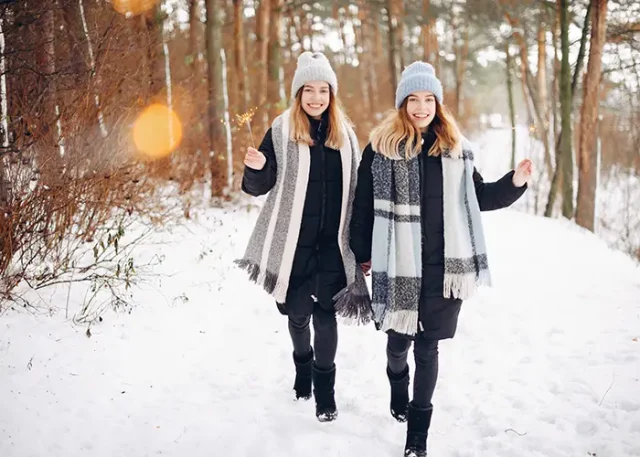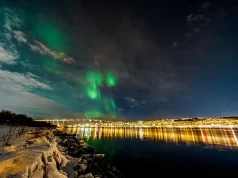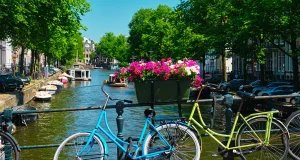
After a summer of record-breaking heat, many people are welcoming the return of colder mornings and the unmistakable festive chill in the air.
According to a new study from Santa’s Lapland, three-quarters (73%) of people report loving the feeling of breathing in crisp winter air, and 74% say that time spent outdoors in winter boosts their mental wellbeing. And it’s no surprise — the cold air often brings with it nostalgic, familiar holiday scents like pine trees, mulled spices, and roaring fires.
What’s more, nearly two-thirds (62%) of people say winter air smells fresher and cleaner than any other season — and there’s science to back up that belief.
To explain this phenomenon, Santa’s Lapland partnered with meteorologist Jim N. R. Dale, founder of British Weather Services, who breaks down why the air feels and smells so noticeably different during the festive season.
What makes the air smell “fresher” in the colder months?
Everyone knows the satisfaction of taking in a long, deep breath of cold winter air. But winter air doesn’t just feel different — it actually changes how we experience the world through scent.
Jim N. R. Dale explains the science behind winter’s signature freshness:
1. Cold air makes manmade smells less intense
Jim explains: “Warmer air allows the molecules within the space to move more rapidly, expand, and become more intense — like the aroma of milk heating on the stove.”
By contrast, cold air keeps scents contained and less pronounced. Similar to how outdoor bins or waste areas smell less noticeable in winter than in summer, colder temperatures reduce the moisture that amplifies odours. This dilution lessens manmade smells, such as those from sewage or pollution, while enhancing natural and semi-natural scents — like pine trees, wood fires, and earthy forest aromas. The result: winter air that feels cleaner and fresher.
2. Snow and frost act as natural scent filters
Winter weather events like snow and frost also influence how we perceive scents. Cold air naturally dulls our olfactory receptors (the molecules responsible for smell), meaning we detect fewer scents overall.
Jim adds that lying snow and frost can act as a “blanket” over the ground, muffling odours beneath them. “A farmyard full of manure might well be less discernible given a reasonable snow cover,” he says. “Snow acts as a natural purifier, while frost slows down and traps the more unpleasant odour molecules.”
3. ‘Cleaner’ airstreams enhance the effect
Colder months tend to bring drier, crisper air from continental or Arctic regions, which makes it feel purer to breathe. “Think of those clearer and colder airstreams as being fresher and purer,” Jim says. “They often originate from areas where the air is cleanest.”
While people everywhere appreciate this seasonal shift, in Finnish Lapland — where snow blankets the landscape for up to 200 days a year — the experience is even more profound. In fact, the World Health Organisation (WHO) ranks Finland as having the cleanest air in the world, making it the perfect place to enjoy the revitalising benefits of winter air.
Why does cold air make us feel so good?
With the majority of people believing winter air boosts their mental wellbeing and say they love the feeling of breathing it in, what’s the science behind this seasonal lift in mood?
Jim explains: “The clarity of the air and the fresh feeling of breathing deeply on a crisp winter’s day act as a stimulant to certain areas of our brain and cardiovascular system. That stimulation is similar to our reaction to a clear blue sky — it’s all about positivity enhancers.”
Psychotherapist Eloise Skinner agrees, noting: “The temperature of winter air can make the environment feel more invigorating and enlivening, allowing us to feel more alert — both psychologically and physically. On a psychological level, we often associate cold air with festive traditions, cosy rituals, and a sense of renewal. Cold air can also encourage us to move more, reducing feelings of ‘fogginess’ or lethargy.”
Gillian Ray, Area Manager at Santa’s Lapland, adds: “During this time of year, when daylight hours are shorter and energy levels can naturally dip, taking a moment to breathe in the cold air and really notice how it feels can create moments that stay with you long after the season ends.
“For travelers, this could mean skipping the typical ‘winter sun’ escape and embracing the magic of colder destinations like Lapland. Exploring snowy landscapes isn’t just about the views — it’s about reconnecting with nature, engaging your senses, and being fully present. Whether you’re walking through a winter forest or feeling the rush of air on a reindeer sleigh ride, every moment offers a reminder of how rejuvenating cold-weather travel can be.”





